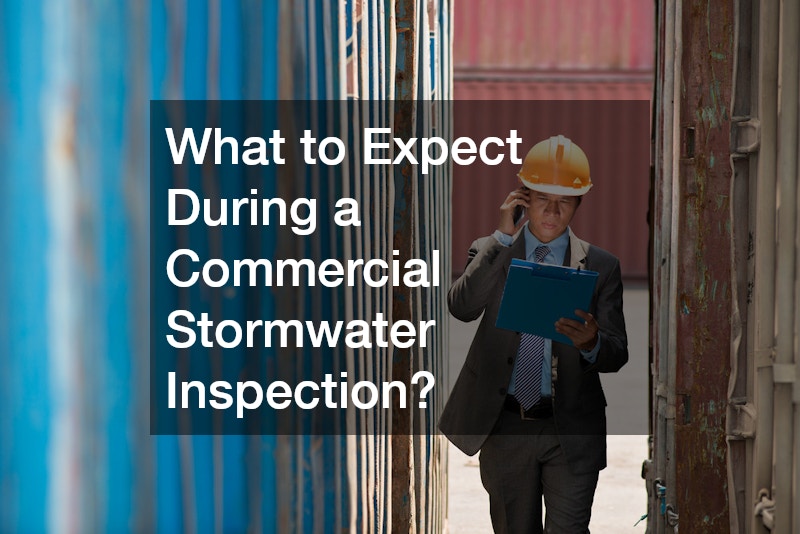
Commercial stormwater inspections play a crucial role in managing and mitigating potential environmental impacts resulting from commercial activities. With increasing urbanization, effective stormwater management is essential to prevent flooding and pollution. Businesses must adhere to local and federal regulations to ensure their stormwater systems function correctly.
Video Source
Understanding the intricacies of these inspections can help businesses prepare and ensure compliance. Inspections are not just about ticking boxes; they are vital for safeguarding ecosystems and infrastructure. Being proactive and informed about the inspection process can save time, resources, and potential penalties.
This article explores what businesses can expect during a commercial stormwater inspection and the importance of being prepared. From initial assessments to compliance recommendations, having a clear understanding of the process will benefit all stakeholders involved. By the end of this article, you'll have a detailed roadmap for navigating these essential inspections.
Stormwater management is a critical aspect of urban planning and infrastructure. It controls the excess rainwater that flows off surfaces like roads and rooftops, directing it safely into drainage systems. Without effective management, stormwater can cause flooding, pollution, and damage to both property and the environment.
Commercial properties, in particular, must manage rainwater efficiently to comply with regulations and minimize their environmental footprint. Polluted stormwater from industrial sites can carry harmful substances into water bodies, affecting aquatic life and water quality. By managing stormwater effectively, businesses contribute to environmental sustainability and public health.
The inspection process helps ensure that stormwater systems are functioning as intended. Inspectors assess the site’s compliance with pertinent regulations and identify areas needing improvement. Regular inspections and maintenance prevent unforeseen issues and maintain system efficiency, thus safeguarding the community and environment.
During a commercial stormwater inspection, inspectors conduct a thorough review of the site's stormwater management systems. This process begins with a site walkthrough, examining all drainage components. Inspectors check for issues such as blockages, structural damage, or signs of erosion.
They also evaluate the site's compliance with applicable permits and regulations. This involves reviewing documentation, such as the Stormwater Pollution Prevention Plan (SWPPP) and previous inspection reports. Inspectors may request evidence of system maintenance and improvements to confirm compliance.
Once the inspection is complete, inspectors provide a detailed report outlining their findings. This report includes observations, identified deficiencies, and recommendations for corrective action. Understanding these findings is crucial for businesses to address issues promptly and efficiently.
One of the most common issues identified during inspections is improper maintenance of stormwater systems. Blocked or damaged drainage can lead to inefficient stormwater management, increasing the risk of flooding. Regular maintenance and inspections help identify issues before they escalate, ensuring continuous system operation.
Another prevalent issue is non-compliance with stormwater permits and plans. This can occur when documentation is outdated or when changes to the property have not been reflected in the management plan. Ensuring all information is current is crucial for adherence to regulations.
Pollution control is another area where inspectors frequently identify problems. Stormwater runoff can carry pollutants like oil, chemicals, and debris; hence, proper measures must be in place to mitigate these risks. Implementing best practices in water management can significantly reduce the environmental impact.
The best way to prepare for a stormwater inspection is to maintain comprehensive documentation and conduct regular self-assessments. Keeping records of all maintenance activities, changes to the system, and employee training sessions is important. These documents provide a clear history and demonstrate your commitment to compliance.
Commercial stormwater inspections are vital for environmental protection and business compliance. They ensure that stormwater systems are adequately managed, reducing risks associated with flooding and pollution. Understanding the inspection process and preparing accordingly can greatly benefit commercial entities.
The rigorous adherence to regulations and best practices fosters sustainable development and community well-being. Businesses play a crucial role in environmental stewardship, and participating actively in stormwater management is a testament to that commitment. By acknowledging and addressing maintenance and regulatory needs, companies contribute positively to their local ecosystems.
Ultimately, a proactive approach to stormwater inspection not only ensures compliance but also strengthens a business’s reputation. It signals responsibility and consideration for broader environmental impacts. Therefore, understanding and navigating commercial stormwater inspections is an essential aspect of modern business operations.
